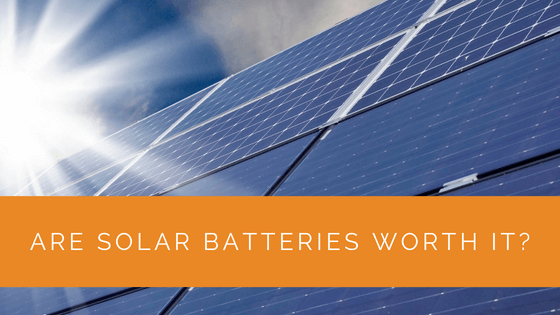Solar batteries, also known as home energy storage systems, are gaining popularity among homeowners who want to make the most of their solar power. These devices store extra electricity generated by solar panels during the day for use at night or during outages. But is it really worth investing in a solar battery? This article will dive into the advantages and disadvantages, explore what affects the cost, and help you decide if a solar battery system is right for your home.
Contents
- 1 Key Takeaways
- 2 How Solar Batteries Work
- 3 Factors that Determine Solar Battery Cost
- 4 The Pros and Cons of Solar Batteries
- 5 Factors to Consider When Deciding on Solar Batteries
- 6 Case Study: Enhancing Energy Independence with Solar Batteries
- 6.1 Background
- 6.2 Project Overview
- 6.3 Implementation
- 6.4 Results
- 6.5 Summary
- 7 Expert Insights From Our Solar Panel Installers About Solar Batteries Worth
- 8 Discover the Power of Solar with Solar Panels Network
- 9 Conclusion
- 10 FAQ
- 10.1 How long do solar batteries last?
- 10.2 What factors influence the return on investment?
- 10.3 Is it worth getting a battery for my solar system?
- 10.4 How many batteries are needed to live off the grid?
- 10.5 Are solar batteries worth it?
- 10.5.1 About the Author
Key Takeaways
- Solar batteries store excess solar energy for later use, offering greater control over your energy supply and potentially reducing reliance on the grid.
- The price of solar batteries varies based on technology, system size, installation, and ongoing maintenance, making it essential to evaluate these costs carefully.
- Consider your energy habits, local electricity rates, battery lifespan, and available incentives before deciding whether to install a solar battery system.
How Solar Batteries Work
A typical solar panel system converts sunlight into electricity for your home. During the day, when your panels produce more energy than you need, the surplus can be stored in a battery instead of being sent back to the grid. This stored energy can then be used at night or during power failures, helping you stay powered without relying on traditional utility companies.
Two main types of batteries are used in solar systems: lithium-ion and lead-acid. Lithium-ion batteries are preferred due to their longer life, lower maintenance, and higher efficiency. Lead-acid batteries are cheaper but require more frequent attention and have a shorter lifespan.

Factors That Determine Solar Battery Cost
The total cost of a solar battery depends on several elements, including the type of battery, the size of the system, and installation expenses. Lithium-ion batteries tend to be pricier upfront but offer better performance and longevity. Installation can also add to the cost, especially if professional services are required. Maintenance and eventual replacement should also be factored into the overall investment.
The Pros and Cons of Solar Batteries
There are clear benefits to using a solar battery system. One major advantage is energy independence—by storing your own electricity, you become less reliant on the grid, which is especially useful during blackouts. Another benefit is potential savings on your electricity bill, as you can use stored energy instead of buying from the utility company.
However, there are some drawbacks. Solar batteries can be expensive, and they will eventually need replacing. Additionally, they have limited capacity, so they may not be sufficient for all your energy needs, especially in larger homes or during extended periods of low sunlight.

Factors to Consider When Deciding on Solar Batteries
Before installing a solar battery, consider your energy usage patterns. If you consume a lot of electricity at night or during outages, a battery could be a smart choice. Also, compare the cost of solar batteries with other storage options like generators or grid-tied systems. Think about how long the batteries will last and the associated maintenance costs.
If your electricity bills are high, a solar battery could save you money in the long run. However, if your electricity costs are low, the return on investment might not be as strong. Check for any incentives or rebates that might reduce the initial cost, such as net metering programs that let you sell excess energy back to the grid.
Case Study: Enhancing Energy Independence with Solar Batteries
Background
Solar Panels Network specializes in delivering tailored solar solutions that meet the unique needs of our customers. This case study highlights a residential project where we installed a solar battery system to improve energy independence and maximize renewable energy use.
Project Overview
We worked with a family looking to reduce their reliance on the grid and ensure a stable power source during outages. After analyzing their energy consumption, we recommended a combination of solar panels and a lithium-ion battery storage system.
Implementation
- Installation Process: We installed a 5 kW PV array paired with a 10 kWh lithium-ion battery. This setup was chosen to provide enough storage for evening and nighttime use. The battery was placed in the garage for easy access and maintenance.
- Technical Specifications: The lithium-ion battery was selected for its durability, low maintenance, and efficient performance. A smart inverter managed the flow of energy between the panels, the battery, and the grid.
- Maintenance Plan: We provided regular checkups, battery health monitoring, and software updates. The system allowed real-time tracking of energy use and storage levels.
Results
- Energy Independence: The system reduced the household’s reliance on the grid by 60%, providing reliable power even during outages.
- Financial Savings: The family saved approximately £800 annually on electricity bills.
- Environmental Impact: The system cut carbon emissions by around 2 tonnes per year.
- Incentives: The family benefited from the Smart Export Guarantee (SEG), earning income by exporting surplus energy.
Summary
This case study demonstrates how integrating solar panels with a battery system can boost energy independence, reduce costs, and support environmental goals. At Solar Panels Network, we help customers make informed decisions about their energy future.
Expert Insights From Our Solar Panel Installers About Solar Batteries Worth
Solar batteries offer significant value in terms of energy independence, especially during outages. They allow homeowners to use their own electricity whenever they need it.
Lead Solar Technician
Lithium-ion batteries are more efficient and require less maintenance, making them ideal for long-term use, even though they cost more upfront.
Senior Battery Installation Specialist
Investing in solar batteries can lead to long-term savings, particularly in areas with high electricity prices. It's a smart move for those looking to reduce their dependence on the grid.
Chief Energy Consultant
Discover the Power of Solar with Solar Panels Network
Looking to harness the full potential of solar energy? Solar Panels Network is here to guide you through the process. As a trusted partner in the UK, we deliver innovative solar solutions designed to meet your specific energy needs. Whether you're a homeowner or a business owner, choosing us means making a sustainable and financially smart decision. Contact us today to start your solar journey.
Conclusion
Solar batteries can be a great investment for homeowners who want to take full advantage of solar energy and reduce their dependency on the grid. However, it's important to weigh the costs, consider your energy usage, and look into available incentives before making a decision. With careful planning, a solar battery system can provide long-term benefits, both financially and environmentally.
FAQ
How long do solar batteries last?
Lithium-ion batteries typically last 10–15 years, while lead-acid batteries usually last 5–7 years. Proper maintenance can extend their lifespan.
What factors influence the return on investment?
The return on investment depends on electricity costs, battery and installation costs, energy usage patterns, and available incentives.
Is it worth getting a battery for my solar system?
It depends on your energy needs and usage. If you want more control over your power and need backup during outages, a battery can be a good choice.
How many batteries are needed to live off the grid?
The number of batteries needed depends on your energy consumption and the system’s storage capacity. Off-grid systems often include multiple batteries for reliable power.
Are solar batteries worth it?
Yes, if you consider your energy habits, electricity costs, and available incentives. Solar batteries can offer long-term savings and greater energy independence.
About the Author
Solar Panels Network is a leading provider of solar energy solutions in the UK. Our team of experienced engineers and consultants offers expert advice and high-quality installations. We are dedicated to promoting clean, sustainable energy and helping our customers achieve their energy goals. Our content is written by professionals to ensure accuracy and relevance for anyone interested in solar technology.
